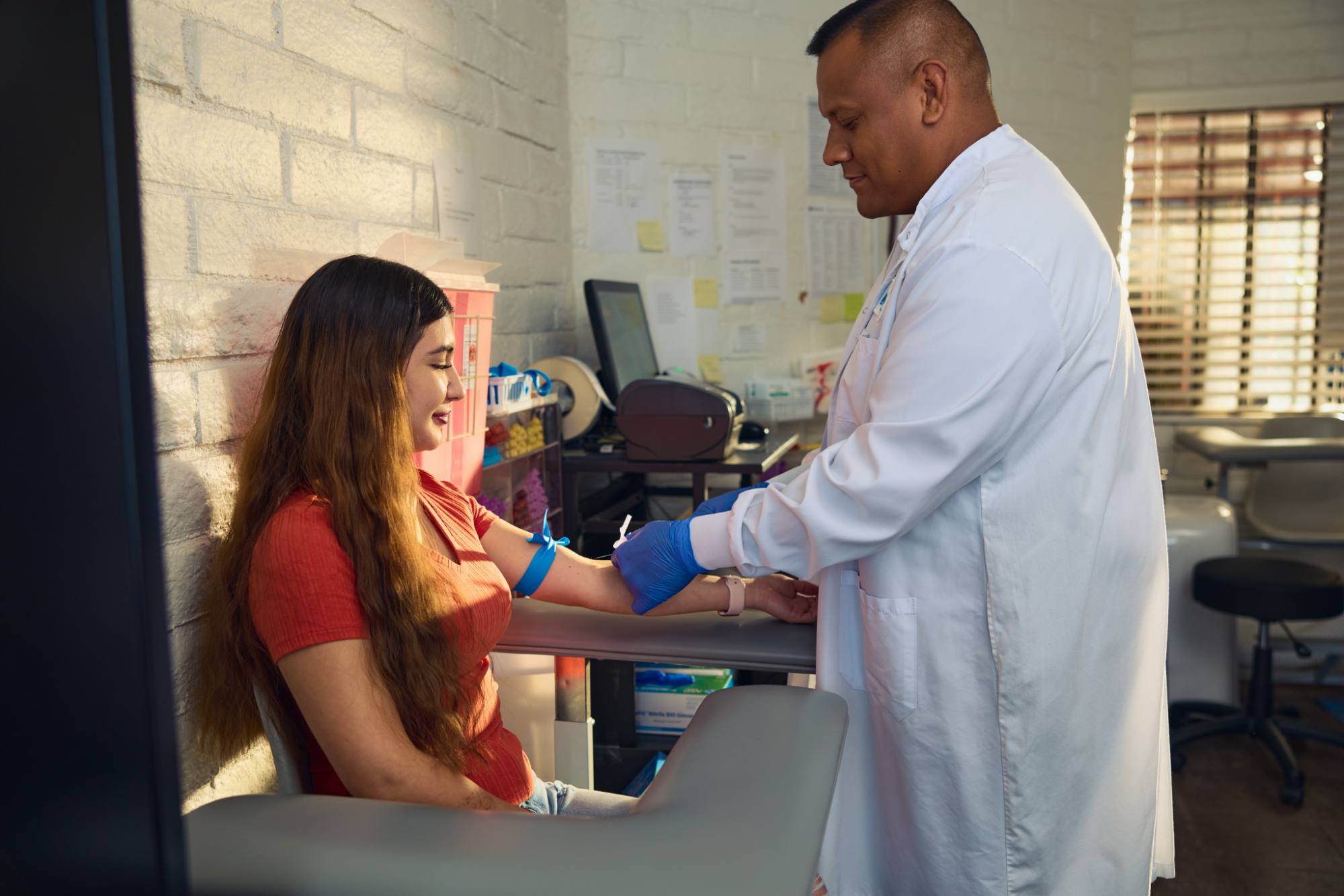STI testing & treatment
Undergo testing and receive treatment for HIV, syphilis, chlamydia, gonorrhea, and Hepatitis C, with testing options that fit your schedule and needs.

Taking care of your sexual health is one of the most important ways to care for your overall well-being. That includes regular STI testing, open conversations with your provider, and access to inclusive, judgment-free care, especially for LGBTQIA2S+ communities, who often face barriers in the healthcare system.
Let’s talk about how to know your status, own your status, and stay in control of your sexual health.
Indisputable: LGBTQIA2S+ Individuals Require and Deserve Customized Sexual Health Services
We believe everyone deserves access to comprehensive, affirming sexual health care—no matter their sexual orientation, gender identity, or expression.
For those who identify as lesbian, gay, bisexual, transgender, queer, intersex, asexual, or Two-Spirit (LGBTQIA2S+), sexual health isn’t a side issue—it’s central. These services directly support people’s right to make empowered, informed decisions about their bodies and futures.
And yet, we recognize a hard truth: the healthcare system in the United States has too often failed LGBTQIA2S+ communities—and still does. From discriminatory treatment and insurance roadblocks to a lack of culturally competent providers, LGBTQIA2S+ individuals face real barriers that contribute to worse health outcomes, particularly when compounded by racism and other systemic inequities.
But here’s the good news: change is possible. As sexual health care providers, we are committed to being part of the solution. That means:
- Offering inclusive, nonjudgmental care
- Connecting patients to LGBTQIA2S+-friendly resources
- Providing services that address the unique needs of every individual we serve
This work matters. And it saves lives.
We’re not just treating patients—we’re building trust, fostering dignity, and making sure that LGBTQIA2S+ people in Arizona have access to the sexual health care services they need and deserve.
What is a sexually transmitted infection (STI)?
STIs (sexually transmitted infections) are infections passed through sexual contact, including vaginal, anal, or oral sex. If you’re sexually active, regular testing is essential for safeguarding your well-being. While the idea of testing may feel overwhelming, knowing your status is a crucial step in protecting your health.
Why get tested
Sexually transmitted infections (STIs) are more common than most people think, and many come with zero symptoms. That means you could have an STI and not even know it.
Left untreated, STIs can lead to serious health issues like infertility, pelvic inflammatory disease, increased risk of HIV, and long-term complications that affect your overall well-being. But the good news? Testing is quick, simple, and highly effective at catching infections early.
At Spectrum Medical, we make testing easy, judgment-free, and accessible for everyone, including the LGBTQIA2S+ community. Getting tested isn’t just about protecting yourself—it’s about taking care of your health, your partners, and your peace of mind.
Don’t wait for symptoms. Make STI testing a regular part of your self-care routine.
Common STIs you may be tested for.
At Spectrum Medical, we offer a safe and confidential place for you to get tested and receive treatment. We test for the following STIs:
- Chlamydia
- A common STI caused by bacteria that can affect your genital area and cause health problems if not treated.
- Hepatitis
- A virus that affects the liver and is transmitted through sexual contact, infected blood, or sharing needles.
- HIV/AIDS
- HIV is a virus that weakens your immune system and can lead to AIDS.
- Gonorrhea
- An STI caused by a bacterial infection that can infect the genitals, throat, and rectum.
- Syphilis
- A common bacterial infection that, if left untreated, can cause serious medical complications.
Who should be tested
Regular STI testing is one of the smartest things you can do for your health, and the guidelines vary based on age, sexual activity, gender, and risk factors.
Here’s what you need to know:
Everyone ages 13 to 64
- Get tested for HIV at least annually and more often if you have risk factors.
Sexually active women under 25
- Get tested yearly for chlamydia and gonorrhea.
Women 25 and older with risk factors
- If you have new or multiple partners—or a partner with an STI—you should be tested for chlamydia and gonorrhea every year.
Pregnant women
- Get tested early in pregnancy for:
If you’re at risk, your provider may also recommend repeat testing and early testing for chlamydia and gonorrhea.- Syphilis
- HIV
- Hepatitis B
- Hepatitis C
Sexually active gay, bisexual, and other men who have sex with men (MSM)
- Test at least once a year for:
If you have multiple or anonymous partners, test every 3 to 6 months.- Syphilis
- Chlamydia
- Gonorrhea
- Get tested for HIV at least once a year—and more often if you’re at higher risk.
- If you’re living with HIV, test for hepatitis C once a year.
People who share injection drug equipment
- Get tested for HIV every year.
Anyone who’s had oral or anal sex
- Talk to your provider about throat and rectal STI testing—these sites can carry infections without symptoms.
Bottom line: Don’t guess—test. Spectrum Medical Care is here to make it easy, respectful, and routine.
Know Your Status. Own Your Status.
Taking control of your sexual health starts with one simple step: talking openly with your provider. Having an honest conversation about your sexual history during your appointment helps ensure you get the right tests, care, and support tailored to your needs.
We’re here to listen—without judgment. Whether it’s your first time getting tested or part of your regular routine, knowing your status empowers you to make informed decisions and stay healthy.
For your convenience, we provide free HIV and STI testing after regular business hours through our Testing After Dark program. Additionally, our U.B.U. Crew offers provides onsite testing at community events.
If you test positive for any STI, our team will guide you through treatment options and provide information to share with your partners.
Your body. Your health. Your status. Own it.
